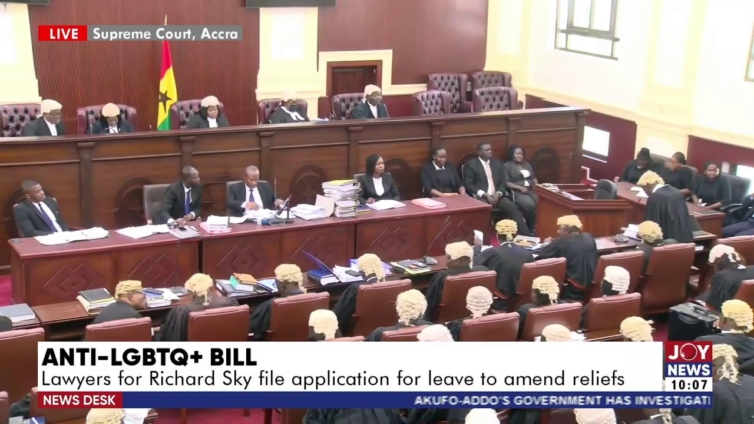A lecturer at the University of Ghana School of Law, Prof Kwadwo Appiagyei-Atua, has expressed his disagreement with granting unfettered media access to courtrooms for live broadcasts of cases.
Speaking on JoyNews’ PM Express, Prof. Appiagyei-Atua emphasised the importance of balancing freedom of expression with the need to regulate media access to court proceedings.
He underscored the role of open access to justice in promoting transparency to the public while cautioning against the potential risks of unrestricted media coverage.
Given that, the law lecturer proposed the development of protocols by the media and the judiciary to determine which cases should be broadcast live.
According to him, cases that are of public interest particularly, illegal mining, elections petitions and serious human rights implications, should be prioritised for live broadcast.
“It is important for us to allow some proceedings to be telecast live, but I would not agree that the media should be granted unfettered access, I think that it should be controlled.
“So the media and the judiciary should develop protocols and determine what cases should be broadcast live,” he told host Evans Mensah.
Prof. Appiagyei-Atua further argued that controlled media access through established protocols would enable people from various backgrounds, including the general public, to observe court proceedings and form informed judgments and opinions.
He emphasised the importance of clear guidelines to govern the organisation of live broadcasts, ensuring transparency and accountability in the process.
“People will learn through the process not only for academics or law students but for the general public who want to be part of the process and want to see how things happen within the courtroom to form their judgment and opinions.
“Through this protocol, you can get clear guidelines as to how this can be organised. It should not be at the request of the Attorney-General for the Chief Justice to decide whether to accept it or not. So when the guidelines are spelled out we will know how to operate.”
His position was concurred by the Executive Director of the Media Foundation for West Africa (MFWA), Sulemana Braimah.
On the same show, Mr Braimah opposed the idea of the press having unrestricted access to live court proceedings.
He noted that some witnesses might feel uncomfortable standing in front of cameras, affecting their behaviour.
“There are people you go to interview and they are quite jittery in normal interviews, not cross-examination or anything…that is why people conduct media training sessions for CEOs and others so they familiarise with it and not behave awkwardly during the interviews," he stated.
Discussions about whether or not courts should broadcast their proceedings returned into the limelight after the Supreme Court, on Wednesday, allowed the live coverage of proceedings related to the controversial Human Sexual Rights and Family Values Bill, commonly referred to as the anti-LGBTQ bill.
This follows a formal request made by the Attorney General, Godfred Dame.
In a letter to the Chief Justice, the Attorney General cited significant public interest in the bill as the basis for the request.
"Respectfully, in view of the public interest in the cases concerning the Human Sexual Rights and Family Values Bill 2024 (the Bill) I would like to recommend that the media (including radio and television) be given full access to the relevant courts to undertake coverage of all proceedings in those cases concerning the Bill," he said in his request to the Chief Justice.
The move has since been commended by many including the Ghana Journalists Association.
Latest Stories
-
Starry Horizon Project: Igniting Ghana’s Passion for Astronomy
2 mins -
CAFCC: Zamalek crowned Confederation Cup champions after nervy win over RS Berkane
6 mins -
Akufo-Addo’s appointment of Kpemka as Deputy BOST MD unconstitutional, says Kwabena Donkor
20 mins -
Rock City Hotel offered the best proposal for 60% stake in 4 Hotels – SSNIT to Ablakwa
22 mins -
Lil Nas X: I felt like an imposter on tour
44 mins -
Government to commission and operationalise Agenda 111 project in phases
1 hour -
Singer Libianca on the pressure to take sides in Cameroon war
1 hour -
Iranian President Ebrahim Raisi killed in helicopter crash, official says
2 hours -
Anne Robinson confirms relationship with Queen’s ex-husband Andrew Parker Bowles
2 hours -
From denial to admission: How a surveillance tape held Sean ‘Diddy’ Combs accountable
2 hours -
Hundreds of Tunisian president’s supporters protest against ‘foreign interference’
3 hours -
3 people dead, including a 6-year-old, after Amtrak train hits pickup truck in New York
3 hours -
P Square’s Peter Okoye gets a hair implant
3 hours -
Twifo ’34’ school building collapses, BECE candidates’ study under trees
3 hours -
Court denies man who shot soldier in Kasoa bail
3 hours

